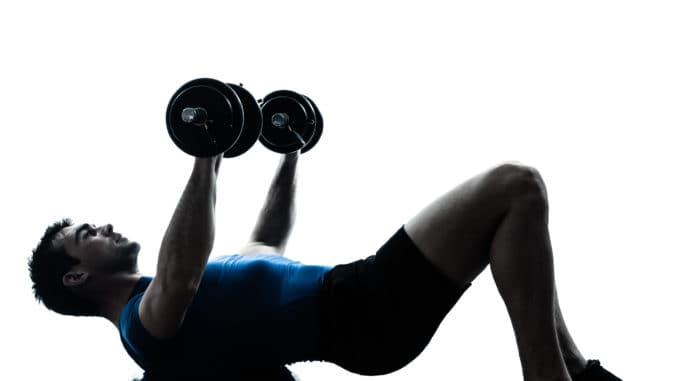
[cmamad id=”22113″ align=”center” tabid=”display-desktop” mobid=”display-desktop” stg=””]
Some studies suggest that the wrong type of exercise, or exercise that is too vigorous, can lower testosterone. Here is the truth about exercise and testosterone…

—-Important Message—-
Here’s How I Naturally Raised My Testosterone by Violating All the Rules
There are these rules that exist when it comes to raising testosterone in men…
Most doctors tell you it can only be done through Big Pharma treatments, patches, or expensive procedures.
But that’s just not true.
I found out for myself when I decided to break all the traditional rules of raising testosterone…
And I got my T-levels up past 900 naturally on my own in just a few short weeks.
The doctor was so amazed, he was honestly kind of mad at me for doing it this way, LOL.
But it didn’t stop there…
It’s because of breaking the rules that I now have 300,000 daily newsletter subscribers and an interview with ABC News.
Here’s how I naturally raised my testosterone to almost 900 by violating all the rules.
———-
Does Exercise Really Raise Testosterone Levels in Men?
If you heard it once, you’ve heard it a thousand times – make sure you get enough exercise.
That’s because exercise has huge health benefits…
And moving even a little bit more than you normally do can make a huge difference to your overall health and well-being.
But what if you can’t exercise for some reason?
Is there a way to get at least some of the benefits of exercise without exercising?
It turns out that the answer to that may be yes…
It seems that exposure to heat can give you at least part of the benefits of exercise.
Let’s check out how it works!
Starting with a cellular structure called the mitochondria.

Mitochondria – the energy engines of cells – are key to good health and great sexual function.
Having mitochondria and having them run efficiently is an essential part of staying healthy.
And many diseases are related to “malfunctioning mitochondria.”
This includes things like heart disease, type 2 diabetes, and other vascular diseases.
“Mitochondria, the ‘energy centers’ of the cells, are essential for maintaining good health. A decrease in the number or function of mitochondria may contribute to chronic and potentially serious conditions such as heart disease, chronic obstructive pulmonary disease, and type 2 diabetes.”
[cmamad id=”22114″ align=”center” tabid=”display-desktop” mobid=”display-desktop” stg=””]
It’s interesting…
When I see something like “heart disease” on a list like this, I also know that if you fix the underlying issue that’s causing it, a lot of guys will also experience better sexual function.
That’s because things like heart disease and pulmonary function are directly related to your blood vessels and arteries.
Usually, problems with your blood vessels and arteries show up in your penis first.
So, if you fix the things that affect your breathing and your heart, then you often get better results in your sex life as well.
Anyhow…back to the subject at hand.
One thing (and there aren’t many) that increases mitochondria production and improves the function of existing mitochondria is exercise.
And I have to tell you – exercise is near magic.
If you can exercise (I’m not talking about going to the gym or working out for hours – a daily walk is fine) then you should.
Exercise has been shown to create new mitochondria and improve the function of existing mitochondria.
However, some people with chronic illnesses are not able to exercise long enough – previous research suggests close to two hours daily – to reap the benefits.
And some people’s lives are so busy that exercise is hard to get in.
That’s why I’m excited about the study. It shows an alternative way to get your mitochondria pumped up.
Heat therapy effectively increases mitochondria production.
This study shows that heat exposure may also work to help your body produce more mitochondria.
“Rodent studies have suggested that heat exposure may also induce the production of more mitochondria.”
And the increase in production from this heat exposure is no small potatoes.
The heat exposure both increased the density of mitochondria and the function of mitochondria significantly.
Mitochondrial function increased by an average of 28% in the heated legs after the heat treatment.
The concentration of several mitochondrial proteins also increased in the heated legs, which, according to the research team, suggests:
“…in addition to improving function, [repeated exposure to heat] increased mitochondrial content in human skeletal muscle…”
This could be a huge boon to people with chronic illnesses, or people who just don’t like to exercise.
One of the things that we teach quite often is how to raise your body temperature.
This helps to create a healing effect throughout your whole body on a consistent basis – and greatly improves health.
You can learn more about how to increase your body temperature here.
In the meantime, if you want to use heat to help improve your health, you may want to consider using a heat lamp – like the kind that is used to grow plants.
These can give you concentrated heat in a safe and effective way (don’t put them directly on your skin, of course).
And while I can’t guarantee that your mitochondria output will increase, there is very little risk in doing this – so it’s worth a shot.
—-Important Message—-
This Pleasurable Exercise Reverses Erection Problems
It’s super-simple, natural, and takes just 90 seconds.
And once you do it, you start sending more blood to your penile chambers…
And this floods the penile chambers with blood which makes the penis stand erect and at attention…
Even if you’ve been struggling to get erections for weeks, months, even years…
PS. This also naturally lowers your blood pressure – two birds, one stone!
———-

- Heat therapy boosts mitochondrial function in muscles
Increased capability of cells' energy centers could help treat heart disease, diabetes
https://www.sciencedaily.com/releases/2018/07/180731092029.htm - Repeated exposure to heat stress induces mitochondrial adaptation in human skeletal muscle
https://www.physiology.org/doi/10.1152/japplphysiol.00383.2018 - Mitochondria
https://www.nature.com/scitable/topicpage/mitochondria-14053590
- Mitochondria - The Cell - NCBI Bookshelf
https://www.ncbi.nlm.nih.gov/books/NBK9896/ - Molecular Expressions Cell Biology: Mitochondria
https://micro.magnet.fsu.edu/cells/mitochondria/mitochondria.html
